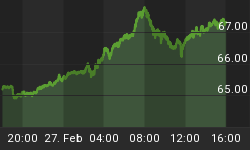Growth And Inflation Are Linked In Investors' Minds

Assume we asked the general investing public:
Are rising prices more likely to occur during an economic expansion or during a recession?
The vast majority of responses would be "during an economic expansion", which tells us economic growth and inflation are tied together in the minds of investors. Therefore, inflation expectations are also tied to economic expectations.
The Fed Has Anchored Inflation And Growth Expectations
After an economic crisis and a period of weak pricing power, one of the first steps toward a healthier economy is when inflation expectations begin to slowly increase, rather than decrease. University of Oregon Professor Tim Duy made some interesting observations on his blog regarding inflation expectations and the Fed:
The Fed is not going to deliberately overshoot inflation, period. That train left the station long ago. So long ago that you can't even here the rumble on the tracks.The train left the station on January 25, 2012, with this statement by the Federal Reserve:
The Committee judges that inflation at the rate of 2 percent, as measured by the annual change in the price index for personal consumption expenditures, is most consistent over the longer run with the Federal Reserve's statutory mandate.
On that day, the Federal Reserve locked in the definition of price stability. They locked it in specifically to prevent even the appearance they might deliberately overshoot as a result of extraordinary monetary policy. They locked it in as a commitment device to tie the hands of future policymakers as they would need to justify changing the definition of price stability, presumably a very high bar for any central banker to cross. On that day, the Federal Reserve took higher inflation expectations off the table. They pulled it from the toolkit. They made clear there is one and only one inflation target for all time. The only tolerable deviations from that target are essentially forecast errors. That's it.
Taking Higher Inflation Expectations Off The Table
If you want the economy and stock market to perform well, an argument can be made that taking higher inflation expectations off the table is a mistake. Janet Yellen's press conference last week did nothing to change the outlook for inflation. The ratio of inflation-protected bonds (TIPS) to intermediate-term Treasuries (IEF) remains in a downtrend that aligns with declining expectations for future inflation.

The Land Of Confusion
The mixed outlook for interest rates, the economy, and inflation is showing up in the financial markets in the form of indecisiveness. Historically, periods when the Federal Reserve begins to talk about possible rate hikes have been marked by uncertainty, investor confusion, and volatility. Thus far, 2014 seems to be following the script. This week's stock market outlook video reviews the big picture, while comparing stocks versus bonds, and long versus short.
Investment Implications - Conviction Needs To Come Out Of Hiding
Conviction speaks to investor confidence about future economic (and inflation) outcomes. A tweet from Monday sums up the current state of affairs:

Two weeks ago we noted the stock market had become more vulnerable. Last week's 25 point rally in the S&P 500 kept the stock bears at bay, but was not enough to inspire bullish confidence. Monday's up and down session was more of the same. If the vulnerabilities, weak economic reports, and slowing momentum push the S&P 500 below the key band of support between 1,844 and 1848, our concerns will increase. For now, the bulls have not ceded enough ground on the fundamental or technical fronts to call for a significant allocation shift. Therefore, a mix of cash and U.S. stocks (SPY) remains prudent. It is also prudent to have a bearish migration plan within an arm's reach.















